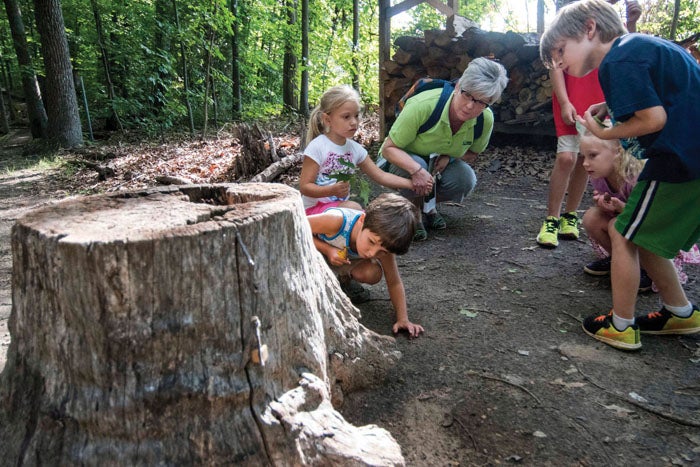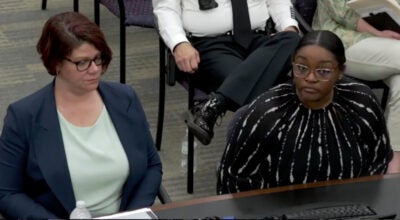Q&A with Summit Academy Principal Amy Pruitt
Published 12:00 am Thursday, August 6, 2020

- Amy Pruitt leads a group on a hike around the Old Setzer Schoolhouse during an earlier camp for rising kindergartners and first-graders. Jon C. Lakey/Salisbury Post File Photo
The Post caught up with Amy Pruitt to learn more about The Summit Virtual K-8 Academy. Pruitt answered some of the most important questions surrounding the district’s newest, and largest school.
Q: What is the virtual school?
Pruitt: The virtual school is a choice for parents to have their students learn from home with a flexible schedule where they can learn from teachers face-to-face virtually and through pre-recorded lessons as it fits their family’s schedule. It’s also a place where they can explore different enrichment options, clubs and passion projects at their own pace.
Q: The school is intended as a permanent option for families. What kind of student will do well in a virtual setting?
Pruitt: Virtual students can work pace their own learning. Depending on their age, they will have a learning coach at home. It may be their parent, grandparent, caregiver, older sibling that they enjoy working with through their educational process, and they still enjoy having a face-to-face teacher to be in contact with and reach out to as needed.
Q: How important is that home support for students who choose the virtual option?
Pruitt: It’s very important. You think about the virtual teacher, the parent and the student as a three-legged stool. You need each one of them working together, performing their role as a learner, a guide, a teacher and facilitators.
Q: How does a virtual option give students the chance to customize their learning to fit their needs?
Pruitt: If a student is working through subject material with their teacher, and the teacher offers enrichment on the subject or hosts an optional seminar, book study or hands-on activity, then the student can pick and choose, as if off a menu, what they want to enhance their learning with.
Q: Why have you been interested in starting a program like this in the district?
Pruitt: I feel like public education needs to offer virtual options for parents because that is a very popular and current offering with private entities. I think education, like everything else in this world, needs to evolve.
Q: Do you want virtual students to identify with their school the same way traditional students identify with their school and mascots?
Pruitt: Whenever we worked with the naming committee to name the school, with Horizons being the hub of the virtual school and kind of a home base, now it is The Summit K-8 Virtual Academy. The idea is you are always striving for the next level whether you are climbing grade to grade or overcoming obstacles with learning, we felt summit was a good grounding point for our students and our parents to connect to. With Horizons Unlimited, since 1989, that name has been tagged on this building and that says it all. There are no boundaries to exploration or education.
Every school loves to have a mascot. Our mascot just happens to be super special because here in the nature area we always have a mating pair of hawks. It’s something that kids can identify with and kids who visited here are connected to. They’re loyal, they’re fierce, they’re adaptable, they’re local. Plus it builds community. It makes it so the kids that are part of the virtual academy can say they are summit students.
Q: What kind of in-person interactions with the students have with teachers?
Pruitt: With the size of the school we will host grade-span educational and social events. It will also be a place where if students need to pick up supplies from teachers they can come and grab those. For our summer camps we had bags that were packed for activities. It will also be a place for teachers to gather to plan when appropriate and receive professional development. It will be a hub.
Q: Does COVID-19 limit how much the facility can be used?
Pruitt: Absolutely. Those things I just described will be in the future when the governor takes us out of the phases for COVID-19.
Q: Does the size of the school at more than 3,000 students intimidate you?
Pruitt: It’s a big weight, but I’m proud to have the opportunity because I think it is going to be a really amazing offering for our parents and our students.
Q: What does a virtual principal do?
Pruitt: My first task, and I’m almost finished with that, is the hiring of the staff, then working with the other RSS departments for other support staff so all students will be served appropriately for their educational plan. We now working on scheduling with the teaching staff, making sure we have teams of teachers that will serve students best in their best placement whether they are regular education or exceptional students with specific learning disabilities, academically gifted students or English language learners. Right now that is a big part of what we’re doing.
We are answering multiple parent questions and concerns daily though emails and phone calls, so everything a principal does every year getting geared up for school including making sure we have supplies and materials we need and getting a PTA organized for the school. Once it opens, I will have assistant principals as leads for the K-5 and the 6-8 grades. We will work together as a team to support the teacher and work with the parents through the transition from brick-and-mortar to virtual.
Q: Is virtual school a viable option for students who are part of exceptional children programs?
Pruitt: Absolutely, it’s a very appropriate placement. We have worked with EC Director Elizabeth Mitcham to secure an entire team. Their skillset as teachers match the needs of the students who have enrolled. Like all students, if for some reason the educational delivery needs to be adjusted or need extra or fewer supports, that will be monitored throughout the school year.
Q: What are some advantages for students with Individual Education Plans who are enrolled virtually?
Pruitt: It always goes back to the flexibility and the self-pacing of the work with your learning coach, with your virtual teachers. I think it always comes back to the flexibility.
Q: What does the first day of school look like for virtual students?
Pruitt: Logging on, meeting your teachers, doing first-day activities, building relationships, checking in on how the students have been while they’ve been away from school. The first day is going to be about learning to make sure when you’re interacting with your teachers and your peers there is an expectation of good digital etiquette.
Q: What happens if a student is not engaged with virtual learning?
Pruitt: The teacher and teaching team would reach out to the student and the parents just like they would in any school setting. They would discuss what obstacles there are, what students might need or any other supports that might need to be put in place for the student to be successful. Virtual school is going to have the same compassion and layout as regular school. If a student starts to drop away or become disconnected thee teaching team has been brainstorming ways to bring students back in so they do not fade away.
Q: How does a virtual school meet the needs of students socially and emotionally?
Pruitt: That’s where our clubs and our enrichment options I mentioned earlier come in. They will mix and mingle with other students who have similar interests or want to explore different interests, and they will have other opportunities for students to work with teachers that aren’t their regular teachers. Maybe they want to be part of a club with another teacher who is a musician or a club with another teacher who is teaching how to take photos with iPads.
Q: How will the virtual school be different from what families expect based on their experience in the spring?
Pruitt: Last year with emergency remote learning it wasn’t like a regular school scheduled day. In the virtual academy, students will have a schedule where they will meet each day that they are in school with their teachers and also their enrichment teachers. They’ll have club time, they’ll have advisory time with someone like a homeroom adviser. It will be more robust and consistent in the delivery.
More News




